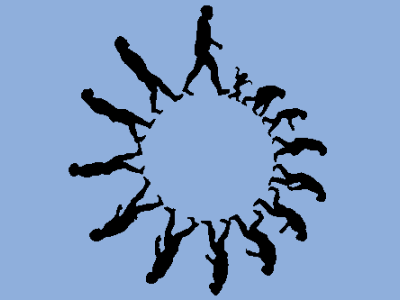Mark Walsh reflects on how training is finally coming of age.
Training is changing as people and societies change. Further, this change isn’t random; it follows a growth pattern. Personal and cultural evolution moves through a number of discreet stages (sometimes called waves) and at each learning and development looks very differently. As trainers and coaches we do not operate in a value-free vacuum but “from” one of these levels. To complicate matters the organisations that we serve, may be at different stage than ourselves.
Before I started my training business I studied psychology and then worked in outdoor education (Outward Bound type work). Through theory and experience I saw how young people developed through stages physically, emotionally, cognitively, even morally. While one age-group could easily solve a problem or manage emotions during a particular activity, others could not. Working increasingly with corporate groups I also saw how adults developed and eventually found both modern psychologists and Eastern thinkers who had mapped this.
How high up the evolutionary ladder am I?
The stages training is evolving through can be outlined using different systems which measure various aspects of development. Spiral Dynamics stresses values, Robert Kegan “orders of consciousness” and Susanne Cooke-Greuter ego development. All systems I have come across, both rigorously researched Western models and those based on Eastern mysticism, have much in common. The overall things that grow are “circle of concern” - with increasing ethical inclusion and timeframes considered, and also crucially for business - effectiveness. To be both clear – one stage is “better” than the next. This idea of growth is understood by most people commonsensically but those who have suffered from externally enforced discrimination – may react violently to the notion of internal “growth hierarchies” and label any idea of development elitist. This is an unfortunate but common misunderstanding.
So how do you know what level of operating you and your colleagues are “at”? This is a crucial question as each wave has its own concerns, language and capabilities. Much of the organisational culture clashes that trainers deal with are due to collisions and misunderstandings between people at different waves. What I have summarised below is a crude generalised map of what training looks like as it evolves:
The Stages of Training
Exploitative
This value set is concerned with "might is right" and sees little value in training unless it will help manipulate others for short-term gains. Sadly the moral development of some in business is still at this level (who dangerously have much higher cognitive development) and I have seen this stage in the NLP world and with sales teams for example.
Traditionalist
Training at this stage is concerned with teaching what is right and wrong according to an orthodoxy. It's more like indoctrination compared to modern training which might see it as "old-school teaching." In the training world there are many myths and unresearched orthodoxies however as to what works. Under the pressure of the recession many organisations have slipped back into this modus operandi – stage have some flexibility. A Traditionalist approach can be stabilising and create clear distinctions, and it can also be closed minded when viewed from higher levels.
Materialist
Mainstream business training is often at this stage and most business in general is conducted from this achievist, individualist and logical mindset. This stage likes results, measurement, "hard" facts and a good evidence base. This is the training of SMART goals, psychometrics and statistics. Its downside is that it often ignores individual subjective and cultural factors which are a part of being human but not easily measured. The revolution of results-based training has occurred as our profession has entered this stage.
Pluralist
Pluralist training takes into account the role of the observer for the first time and has a more “sensitive” feel than previous stages. If you’re thinking "you can't generalise” or "we all see things different” then a Relativist lens may be at work.
Coaching becomes possible at this stage and trainers may prefer to call themselves "learning facilitators" or the like. Many trainers are "people-people" operating from this level in largely Materialist organisations. This can be painful and frustrating as the Pluralist trainers are seen as "fluffy" and the Materialist accountant s that control their budgets as overly hard.
Pluralist is a "sensitive" stage concerned with equality and diversity training for better and sometimes for PC worse (though this is often Traditionalist s dressed as Pluralists).
Integral
Integral trainers can start to see the truth of, and incorporate aspects of previous stages - moving skilfully between them. They may hold the view that "nobody is smart enough to be completely wrong all the time" (Wilber). This stage is a leap forward as up to this point there are and clashes of values in companies and between trainers and delegates. From a marketing point of view Integral is also great as it allows trainers to speak in the most appropriate language for their audience. Different industries tend to have differently evolved "centres of gravity" - some legal and NHS organisations in the UK are still heavily Traditionalist while charities may be more Pluralist for example. The beauty of Integral trainers is that it can harmonise with all of these.
Conclusion
People can’t be pigeonholed “as” or even “at” a stage, and where I have used such language it is only to be concise. People are complex and multi-sided, yet still have a consistent “operating systems” that changes only slowly over time. Note also that the psychological and cultural stages described have organisational and technological correlates. It is no coincidence for example that information technology companies like Google and Yahoo tend to be leading edge in their organisation and culture too.
I am indebted to the work of philosopher Ken Wilber for much of content of this article, and also that of businessmen Fred Kofman in the US and Martin Egan in the UK. There are a currently just a few leading-edge business training organisations using an evolutionary approach in the British Isles, though I suspect this will grow as its benefits become clear. Understanding the evolution of organisations and training is a huge advantage, though where exactly we are heading however, nobody knows.
Mark Walsh is a UK pioneer of bringing integral and evolutionary ideas into business. Based in Brighton, Sussex, he heads Integration Training - business training providers specialising in management and leadership training, team building, stress management and time management training. Contact Mark on 07762 541 855 or visit his training blog.










